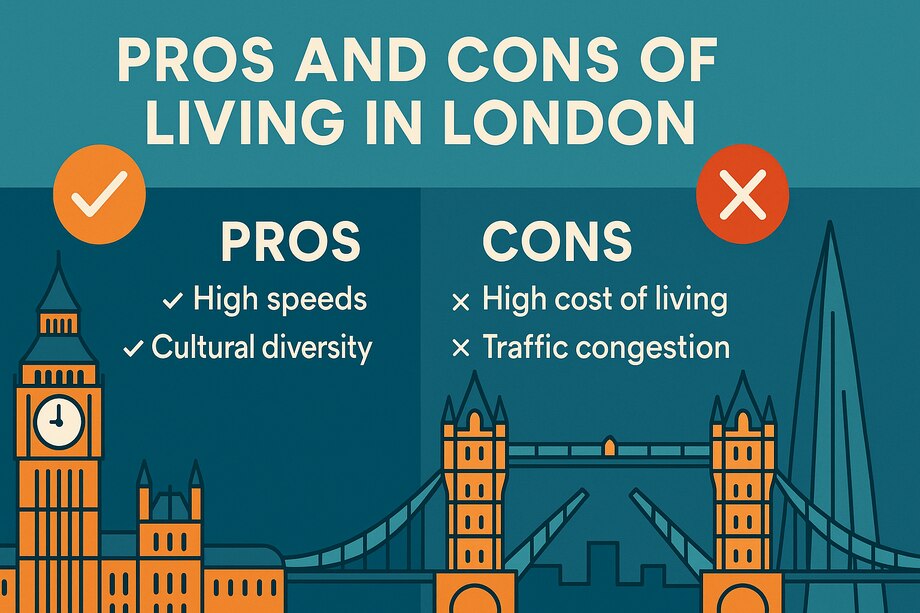Pros and Cons of Living in London – The Complete Guide for 2025

London stands as one of the world’s most iconic cities, consistently ranking as a top destination for professionals, students, and families seeking opportunities in a truly global metropolis. With its rich history, cultural diversity, and status as a major financial hub, London attracts millions of new residents annually. However, life in the capital comes with both remarkable advantages and significant challenges.
Whether you’re considering relocating from elsewhere in the UK, moving internationally, or simply weighing your options, this comprehensive guide examines the realities of London living in 2025, drawing from current data, resident experiences, and expert insights.
Overview: London in 2025
London is home to approximately 8.8 million people, making it the largest city in the UK and one of the most populous urban areas in Europe. The city continues to evolve rapidly, with significant infrastructure developments including the HS2 railway project, which is projected to inject £10 billion into the economy over the next decade and create approximately 19,000 jobs.
According to multiple quality of life indices, London ranks 4th globally in the list of best places to live in the world and 1st best city to live in the United Kingdom, despite the high costs associated with living there.
The Major Pros of Living in London
1. Unparalleled Career Opportunities and Higher Salaries
London’s status as a global financial and business hub creates exceptional career prospects across multiple industries.
Global Business Center London is the business capital of the UK and a hub for global companies. Whether you want to work in finance, tech, media, or fashion, London has it all. Many of the biggest companies in the world have offices here, offering extensive networking opportunities and career advancement potential.
Salary Premium The average wage in London is 25% higher than other areas of the UK. While this is partly due to high-paying roles in banking, law, and technology, the salary weighting helps offset the higher cost of living. To live comfortably in London in 2025, a gross salary of £40,000–£55,000 is recommended, with £60,000 or more offering greater flexibility.
Industry Diversity One of the most significant advantages of London is its status as a global hub for industries ranging from finance to creative arts. This creates opportunities across multiple sectors and provides excellent networking potential through the city’s numerous professional events and meetups.
2. World-Class Cultural Scene and Entertainment
London’s cultural offerings are virtually unmatched globally, providing endless opportunities for enrichment and entertainment.
Theatrical Excellence London is home to incredible theatres like the West End, offering world-class performances from musicals to dramatic productions. Many shows premiere in London before touring globally, giving residents first access to new productions.
Museums and Galleries The city boasts some of the world’s best museums and galleries, including the British Museum, Tate Modern, and Natural History Museum. The best part? Many museums are free, making culture accessible to all residents.
Music and Nightlife London’s nightlife is as incredible and diverse as the rest of the city, with bars, pubs, music venues and clubs to appeal to all tastes. The Night Tube runs 24 hours on Fridays and Saturdays, making it easy to enjoy the city’s vibrant evening scene.
3. Exceptional Public Transport Network
London boasts one of the world’s most comprehensive and efficient public transport systems.
Comprehensive Coverage London has one of the best public transport systems in the world, including the Tube, buses, trains, and cycling routes. Virtually every part of the city is served by either a bus or the Tube, and the majority of Londoners commuting into the city do so via public transport.
24/7 Connectivity The Night Tube service and extensive bus network ensure that you can travel across the city at virtually any time, making it unnecessary to own a car for most residents.
Cost Efficiency As of 2025, a Monthly Travelcard for unlimited travel in Zones 1-2 costs around £138.70, while for Zones 1-6 it’s about £246.60. Despite seeming expensive, this represents good value when compared to car ownership costs in the city.
4. Incredible Diversity and Cultural Richness
London is one of the most diverse cities in the world, creating a rich, multicultural environment.
Global Melting Pot People from over 270 nationalities live in London, making it a true melting pot of cultures. Each neighborhood has its own unique vibe, and you can find food, music, and traditions from almost every country.
Cultural Integration This diversity creates a welcoming environment whether you’re moving for work, study, or a fresh start. The city’s multicultural nature means you’ll meet people from all walks of life and rarely feel out of place.
Language Advantages With over 200 languages spoken in the city, London serves as an excellent gateway for international communication and business.
5. Free Healthcare Through the NHS
Access to the National Health Service represents one of the most significant benefits of London living.
Universal Healthcare The NHS (National Health Service) is hugely important to UK residents, providing healthcare to everyone who lives there. Emergency care, GP visits, and most treatments are free at the point of use.
No Medical Bills Unlike many other major cities globally, residents don’t face large hospital bills for emergency care, childbirth, or ongoing medical treatment, providing significant financial security.
6. Educational Excellence
London hosts some of the world’s most prestigious educational institutions.
World-Renowned Universities The UK is home to prestigious universities including the University of Oxford, Cambridge, and Imperial College London, with many based in or near London.
Educational Diversity The city offers excellent state schools (free for residents) as well as prestigious private institutions, providing quality education options for families.
7. Gateway to Europe and Global Travel
London’s strategic location provides exceptional travel opportunities.
European Access England’s location makes it a gateway to Europe, offering easy access to destinations like Paris, Amsterdam, and Barcelona. The Eurostar provides high-speed train connections to continental Europe.
Global Connectivity London’s airports offer flights to virtually every major destination worldwide, making international travel convenient for business or leisure.
8. Rich History and Architecture
Living in London means being surrounded by centuries of history and architectural beauty.
Historical Significance London has been an important location since Roman times, and the city’s rich historical heritage is visible throughout, from ancient landmarks to Victorian architecture.
Architectural Diversity From historic Georgian townhouses to modern skyscrapers, London offers diverse living environments and constantly evolving neighborhoods.
The Major Cons of Living in London
1. Extremely High Cost of Living
London’s cost of living is one of the highest globally, creating significant financial pressure for most residents.
Housing Costs Housing is typically the largest expense for Londoners. Rental prices for 2025 show studio apartments costing £1,300–£1,800/month in zones 1–2, with one-bedroom apartments ranging from £1,800–£2,500/month. Central London properties can exceed £4,000 per month.
Overall Expenses A single person’s estimated monthly costs are around £5,243, while a family of four faces estimated monthly costs of £7,092. Many residents find that you might not be able to save having £5,000 per month in London as a couple with children, as rent alone would be at least £2,500.
Utilities and Additional Costs Monthly utility bills range from £160 to £326 depending on property size, plus council tax of £125-£165 monthly. The cumulative effect of high costs across all categories makes saving money particularly challenging.
2. Overcrowding and Space Limitations
London’s popularity creates significant overcrowding issues affecting daily life.
Population Density With 9 million residents and millions of tourists visiting annually, London can feel very crowded. Public transport during rush hours, popular attractions, and even grocery stores can become uncomfortably busy.
Limited Living Space Studio flats and tiny one-bedroom flats are the norm, usually with a huge lack of space. Many flats don’t have gardens, and residents may spend most of their time in one room if working from home.
Competition for Resources Everything from restaurant reservations to GP appointments can be difficult to secure due to high demand and competition.
3. Transport Challenges and Costs
Despite having excellent public transport, London faces significant transportation issues.
Rush Hour Congestion Public transport becomes extremely crowded during peak hours, making commutes uncomfortable and stressful. Delays are common across all transport modes.
High Transport Costs Transport expenses add up quickly, particularly for families or those traveling across multiple zones regularly. Annual transport costs can exceed £3,000 for comprehensive coverage.
Limited Cycling Infrastructure While improving, cycling infrastructure remains inadequate for the city’s size, making bike commuting challenging and sometimes dangerous.
4. Weather and Climate Challenges
London’s weather is frequently cited as a major drawback by residents and visitors alike.
Persistent Rain and Grey Skies London experiences frequent rainfall and overcast conditions throughout much of the year, which can significantly impact mood and outdoor activities.
Limited Sunshine The lack of consistent sunny weather affects lifestyle choices and can contribute to seasonal depression for some residents.
Impact on Daily Life Weather conditions require constant preparation for rain and can limit outdoor recreational activities, particularly affecting those from sunnier climates.
5. Safety and Crime Concerns
While London remains relatively safe by global standards, crime is a legitimate concern for residents.
Crime Statistics London experiences various types of crime, with particular issues around theft and pickpocketing in tourist areas. Phone thefts are becoming increasingly common, with nearly 200 phones stolen daily in some areas.
Transport Safety The overall crime rate on the transport network is 12.7 offences per one million passenger journeys, with theft being the main issue. The Underground sees 18.6 crimes per million journeys.
Hate Crime Increases Recent data shows growing numbers of hate crime offences, particularly antisemitic incidents and Islamophobia, though these remain under-reported according to police assessments.
6. Social and Lifestyle Pressures
Living in such a fast-paced, expensive city creates unique social pressures.
Work-Life Balance The competitive job market often leads to long working hours and high stress levels, making it difficult to maintain a healthy work-life balance.
Social Costs Entertainment and dining out are expensive, making it costly to maintain an active social life. This can lead to social isolation for those on tighter budgets.
Keeping Up with Costs The pressure to maintain London standards of living can be financially and emotionally exhausting, particularly for young professionals or families.
7. Noise and Urban Stress
As a major global city, London comes with significant urban challenges.
Constant Noise London is noisy, whether from planes traveling to airports, trains, traffic, or people. The constant urban noise can be mentally exhausting and affect sleep quality.
Air Pollution Despite improvements, air quality remains a concern, particularly along major roads and in central areas.
Urban Fatigue The combination of crowds, noise, and fast pace can lead to mental fatigue and stress for many residents.
Financial Realities of London Living
Salary Requirements for Different Lifestyles
Single Professionals:
- Minimum comfortable living: £40,000-£55,000 gross annual salary
- For central London living: £60,000+ recommended
- Sharing accommodation can reduce requirements to £35,000-£45,000
Couples:
- Combined income of £60,000-£80,000 for comfortable living
- £80,000+ for families with children
- Sharing costs significantly improves lifestyle possibilities
Students:
- £1,200-£1,500 monthly budget possible with careful planning
- University accommodation averages £1,200 monthly
- Part-time work helps offset costs but is limited by visa restrictions
Monthly Budget Breakdown
Essential Expenses (Single Person):
- Rent (1-bedroom, zones 1-2): £1,800-£2,500
- Rent (shared accommodation): £800-£1,200
- Utilities: £160-£250
- Council Tax: £125-£165
- Transport: £139-£247 (depending on zones)
- Food: £300-£500
- Total: £3,000-£4,500+ monthly
Neighborhood Considerations
Best Areas for Different Demographics
Young Professionals:
- Shoreditch: Creative hub with excellent nightlife
- Canary Wharf: Modern, business-focused with newer apartments
- Clapham: Popular with young professionals, good transport links
Families:
- Richmond: Green spaces, excellent schools, family-friendly
- Wimbledon: Suburban feel with good transport connections
- Greenwich: Historic, maritime heritage, less crowded
Students:
- King’s Cross: Close to universities, good transport
- Bloomsbury: Traditional academic area near UCL
- South London: More affordable options with decent connections
Budget-Conscious:
- Croydon: Significantly cheaper, good transport links
- Zones 3-4: Lower rents while maintaining transport access
- Shared accommodations: Available across all areas
Safety Considerations
Current Safety Landscape
London remains relatively safe compared to many major global cities, but residents should be aware of specific risks:
Common Safety Issues:
- Pickpocketing in tourist areas and on public transport
- Phone theft, particularly around popular landmarks
- Occasional knife crime, though primarily affecting specific demographics
- Transport-related theft and harassment
Safety Improvements: The Metropolitan Police have made significant improvements, with HMICFRS moving the service out of enhanced monitoring in January 2025. The Mayor’s new Police and Crime Plan for 2025-2029 focuses on enhanced neighborhood policing and crime reduction.
Personal Safety Tips:
- Stay alert in crowded areas, especially tourist hotspots
- Secure belongings and avoid displaying expensive items
- Use official transport and avoid unmarked taxis
- Be aware of surroundings when using phones or devices
Healthcare Access
NHS Benefits and Challenges
Advantages:
- Free healthcare at point of use for residents
- No insurance premiums or deductibles
- Comprehensive coverage including emergency care
- Free prescription medications for many conditions
Current Challenges:
- Longer waiting times for non-emergency procedures
- Difficulty securing GP appointments
- Limited availability for specialized treatments
- Dental care accessibility issues
Private Healthcare Options
Many residents supplement NHS care with private health insurance costing £60-£120 monthly for additional benefits and faster access to specialists.
Making the Decision: Is London Right for You?
London is Ideal if You:
- Have strong career ambitions in finance, tech, media, or creative industries
- Value cultural diversity and international opportunities
- Enjoy urban life with access to world-class entertainment and culture
- Can secure a salary of £50,000+ (or £80,000+ for families)
- Don’t mind crowded, fast-paced living environments
- Want access to excellent public transport
- Appreciate historical significance and architectural beauty
Consider Alternatives if You:
- Prioritize affordable living and saving money
- Prefer quiet, spacious living environments
- Need consistent sunny weather for well-being
- Want to own property in the near term
- Prefer car-based transportation
- Value work-life balance over career advancement
- Are sensitive to noise and crowded conditions
Future Outlook for London
Infrastructure Developments
Major Projects:
- HS2 railway development bringing improved connectivity
- Housing reforms including abolition of leasehold system
- Enhanced transport network improvements
- Digital infrastructure upgrades
Economic Outlook:
- Continued growth as European financial hub post-Brexit
- Technology sector expansion
- Government investment in infrastructure and housing
- Growing focus on sustainability and green initiatives
Quality of Life Improvements
Government Initiatives:
- £63 million investment in homelessness programs
- Enhanced policing and community safety measures
- Public space improvements for women and girls’ safety
- Investment in youth programs and community facilities
Conclusion
Living in London in 2025 offers a unique combination of opportunities and challenges that few cities worldwide can match. The capital provides unparalleled career prospects, cultural richness, and global connectivity, while maintaining excellent public transport and free healthcare. However, these advantages come at a significant financial cost, with high housing prices, overcrowding, and intense urban pressures affecting daily life.
Your decision should ultimately reflect your personal priorities, financial situation, and life stage. For young professionals seeking career advancement, cultural enthusiasts, and those who thrive in diverse, fast-paced environments, London’s benefits often outweigh its costs. However, families, budget-conscious individuals, or those seeking a quieter lifestyle may find better value and satisfaction elsewhere.
London remains one of the world’s great cities, but it demands careful financial planning, realistic expectations, and a genuine appreciation for urban living. Those who can navigate its challenges often find it an incredibly rewarding place to build a life and career in one of the world’s most dynamic metropolises.
Last Updated on August 21, 2025 by James Cartwright







